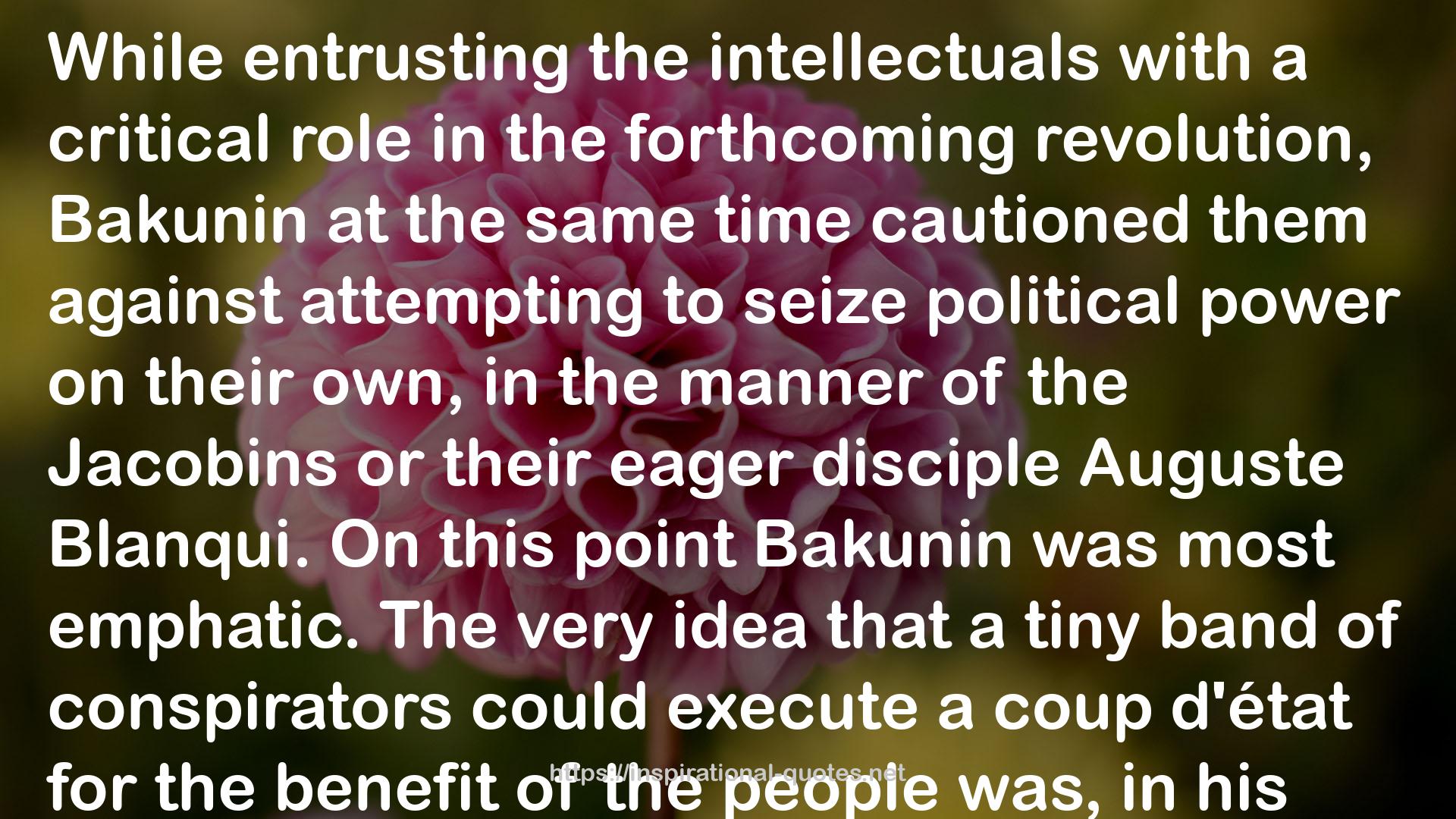" While entrusting the intellectuals with a critical role in the forthcoming revolution, Bakunin at the same time cautioned them against attempting to seize political power on their own, in the manner of the Jacobins or their eager disciple Auguste Blanqui. On this point Bakunin was most emphatic. The very idea that a tiny band of conspirators could execute a coup d'état for the benefit of the people was, in his derisive words, a "heresy against common sense and historical experience." These strictures were aimed as much at Marx as at Blanqui. For both Marx and Bakunin, the ultimate goal of the revolution was a stateless society of men liberated from the bonds of oppression, a new world in which the free development of each was the condition for the free development of all. But where Marx envisioned an intervening proletarian dictatorship that would eliminate the last vestiges of the bourgeois order, Bakunin was bent on abolishing the state outright. The cardinal error committed by all revolutions of the past, in Bakunin's judgment, was that one government was turned out only to be replaced by another. The true revolution, then, would not capture political power; it would be a social revolution, ridding the world of the state itself. "
― Paul Avrich , The Russian Anarchists
Image for Quotes

Bakunin at the same time cautioned them against attempting to seize political power on their own, in the manner of the Jacobins or their eager disciple
Auguste Blanqui. On this point Bakunin was most emphatic. The very idea that a tiny band of conspirators could execute a
coup d'état for the benefit of the people was, in his derisive words, a "heresy against common sense and historical experience." These strictures were aimed as much at
Marx as at Blanqui. For both Marx and Bakunin, the ultimate goal of the revolution was a stateless society of men liberated from the bonds of oppression, a new world in which the free development of each was the condition for the free development of all. But where Marx envisioned an intervening proletarian dictatorship that would eliminate the last vestiges of the bourgeois order, Bakunin was bent on abolishing the state outright. The cardinal error committed by all revolutions of the past, in Bakunin's judgment, was that one government was turned out only to be replaced by another. The true revolution, then, would not capture political power; it would be a
social revolution, ridding the world of the state itself." style="width:100%;margin:20px 0;"/>
 Bakunin at the same time cautioned them against attempting to seize political power on their own, in the manner of the Jacobins or their eager disciple Auguste Blanqui. On this point Bakunin was most emphatic. The very idea that a tiny band of conspirators could execute a coup d'état for the benefit of the people was, in his derisive words, a "heresy against common sense and historical experience." These strictures were aimed as much at Marx as at Blanqui. For both Marx and Bakunin, the ultimate goal of the revolution was a stateless society of men liberated from the bonds of oppression, a new world in which the free development of each was the condition for the free development of all. But where Marx envisioned an intervening proletarian dictatorship that would eliminate the last vestiges of the bourgeois order, Bakunin was bent on abolishing the state outright. The cardinal error committed by all revolutions of the past, in Bakunin's judgment, was that one government was turned out only to be replaced by another. The true revolution, then, would not capture political power; it would be a social revolution, ridding the world of the state itself." style="width:100%;margin:20px 0;"/>
Bakunin at the same time cautioned them against attempting to seize political power on their own, in the manner of the Jacobins or their eager disciple Auguste Blanqui. On this point Bakunin was most emphatic. The very idea that a tiny band of conspirators could execute a coup d'état for the benefit of the people was, in his derisive words, a "heresy against common sense and historical experience." These strictures were aimed as much at Marx as at Blanqui. For both Marx and Bakunin, the ultimate goal of the revolution was a stateless society of men liberated from the bonds of oppression, a new world in which the free development of each was the condition for the free development of all. But where Marx envisioned an intervening proletarian dictatorship that would eliminate the last vestiges of the bourgeois order, Bakunin was bent on abolishing the state outright. The cardinal error committed by all revolutions of the past, in Bakunin's judgment, was that one government was turned out only to be replaced by another. The true revolution, then, would not capture political power; it would be a social revolution, ridding the world of the state itself." style="width:100%;margin:20px 0;"/>